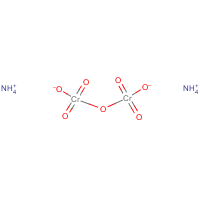Ammonium dichromate
Agent Name
Ammonium dichromate
CAS Number
7789-09-5
Formula
Cr2-H2-O7.2H3-N
Major Category
Metals

Synonyms
Ammonio (bicromato di) [Italian]; Ammonio (dicromato di) [Italian]; Ammonium (dichromate d') [French]; Ammonium bichromate; Ammonium chromate ((NH4)2Cr2O7); Ammonium dichromate (VI); Ammoniumbichromaat [Dutch]; Ammoniumdichromaat [Dutch]; Ammoniumdichromat [German]; Bichromate d'ammonium [French]; Chromic acid (H2Cr2O7), diammonium salt; Diammonium dichromate; Dichromic acid (H2Cr2O7), diammonium salt; [ChemIDplus] UN1439
Category
Chromium Compounds, Inorganic
Description
Bright orange-red odorless solid; Very soluble in water; [Merck Index] Orange solid; Soluble in water; [ACGIH]
Sources/Uses
Used in photo engraving, dye mordants, pigments, oil purification, pickling, leather tanning, photography, process engraving, lithography, pyrotechnics, and glazes for porcelain and chinawares; [HSDB] Used as a nitrogen source and to make magnetic recording materials; [Merck Index] Used in pyrotechnics, wood preserving, and lithography; Regulated in Germany as an explosive, and it is distributed moist; [Ullmann]
Comments
A strong oxidizing agent that is a skin and eye irritant, a dangerous fire risk, and potentially explosive if in contact with organic substances; [Hawley] A skin, eye, nose, and throat irritant; [HSDB] May cause asthma, perforation of the nasal septum, and skin ulcers; [CAMEO] Explosion hazard; An irritant; May cause serious eye injury; May cause skin and respiratory sensitization after prolonged contact; [MSDSonline] See "Chromium" and linked occupational diseases.
Biomedical References
Exposure Assessment
Skin Designation (ACGIH)
Yes
TLV (ACGIH)
0.0002 mg/m3, as Cr(VI), inhalable particulate matter
STEL (ACGIH)
0.0005 mg/m3, as Cr(VI), inhalable particulate matter
PEL (OSHA)
0.005 mg/m3, as Cr(VI)
Lethal Concentration
LC50 (rat) = male: 82 mg/m3/4 hr; female: 45 mg/m3/4 hr
NFPA
must be preheated
Adverse Effects
Skin Sensitizer
Yes
Asthma
Yes
Hepatotoxin
Hepatoxic (a) from occupational exposure (secondary effect) or (b) in animal studies or in humans after ingestion
Nephrotoxin
Yes
Dermatotoxin
Skin burns
IARC Carcinogen
Established
ACGIH Carcinogen
Confirmed Human
Diseases, Processes, and Activities Linked to This Agent
Diseases
Occupational diseases associated with exposure to this agent:
Processes
Activities
Activities with risk of exposure: